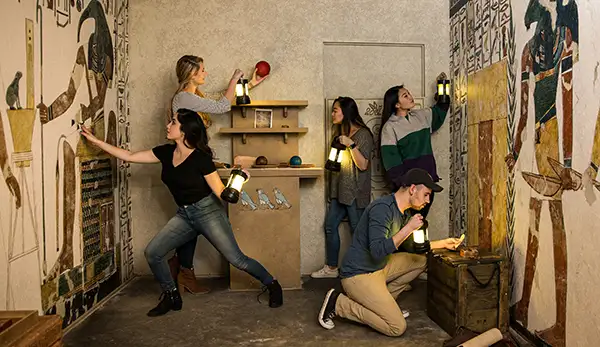Discover the Best Escape Room in Minneapolis-- Interactive and Involving Enjoyable
Discover the Best Escape Room in Minneapolis-- Interactive and Involving Enjoyable
Blog Article
Group Techniques: How to Collaborate Successfully in an Escape Room
Navigating the complexities of a retreat space necessitates greater than plain interest; it requires a well-coordinated strategy based in clear communication, critical role tasks, and experienced time administration. Groups need to actively listen to each participant's understandings, appoint roles that straighten with specific staminas, and keep normal check-ins to make certain emphasis and prevent redundancy. By cultivating an atmosphere that values cohesion and adaptability, groups can substantially increase their performance and success rates. The nuances of these strategies can change the experience, yet how exactly can they be applied to maximize the capacity for success?
Establish Clear Interaction

To help with clear communication, it is important to mark a main factor of call for info dissemination. Short, concentrated updates from each group member can keep the team notified without frustrating them with information.

Appoint Functions Purposefully
While clear interaction establishes the structure for effective teamwork, designating functions purposefully makes certain that each staff member's strengths are used effectively. In a getaway area circumstance, the time-sensitive and intricate nature of difficulties demands an efficient technique to task delegation. By identifying and leveraging individual expertises, groups can optimize their analytical capacities and boost overall performance.
First, analyze the special abilities and characteristics of each individual. A person with an eager eye for information could succeed in discovering concealed things, while a logical thinker might be better suited to resolving puzzles. It's equally important to have a leader who can oversee development, take care of the timeline, and make decisive telephone calls when required. This function often requires strong business and interpersonal abilities.
Second, make sure that duties are flexible and adaptable. As new obstacles arise, the group needs to be able to pivot, reapportioning tasks as needed. This flexibility aids keep energy and stops traffic jams that might happen because of inflexible role jobs.
Inevitably, a strategic method to role project not just optimizes the toughness of each employee but also promotes a natural environment, driving the group towards an effective retreat.
Utilize Diverse Skills
Identifying and taking advantage of the diverse skills within your group can substantially elevate your efficiency in a getaway area. Each employee brings special toughness to the table, and efficiently leveraging these capacities can accelerate problem-solving and improve overall performance. As an example, a staff member with strong logical abilities could succeed at understanding intricate codes or patterns, visit this website while one more with keen observational capabilities may promptly identify surprise clues that could neglect.
Motivate team members to voice their insights and concepts quickly, ensuring that all possible solutions are taken into consideration. Additionally, appointing tasks that align with each participant's staminas can avoid bottlenecks and ensure that progress is constant.
Moreover, diversity in abilities often converts to diversity in thinking styles, which is invaluable in an escape space setting. While some obstacles may need logical reasoning and precision, others might take advantage of imaginative and side thinking. By identifying and leveraging this diversity, groups can attend to a more comprehensive variety of difficulties much more efficiently, therefore enhancing their opportunities of an effective escape.
Manage Time Properly

Identify noticeable challenges and split tasks based on team participants' staminas, ensuring that nobody is still. This technique can help keep the group concentrated and stop time from sliding away unnoticed.
Additionally, prevent one-track mind. If a problem is taking also long, turn group participants or go on to an additional challenge, returning later on with fresh point of views. Interaction is extremely important-- maintain everyone upgraded on addressed puzzles and staying tasks to avoid redundant initiatives.
Finally, utilize any type of tips or hints sparingly yet purposefully - best escape room. Understanding when to ask for help can save useful time. By adhering to these time management concepts, teams can substantially improve their possibilities of an effective and delightful escape space experience
Debrief and Mirror
Reflection is an essential aspect of group growth and renovation in the context of getaway areas. Once the difficulty is finished, whether efficiently or otherwise, it is critical for the team to involve in a structured debriefing session. This process allows employee to analyze their efficiency, identify strengths, and determine areas for enhancement.
Begin the debrief by discussing what worked out. Highlight particular instances of efficient communication, problem-solving, and collaboration. Identifying these favorable habits enhances them and motivates their repetition in future difficulties.
Discuss minutes of confusion, miscommunication, or ineffective techniques. Urge an open and positive dialogue where team participants can share their viewpoints without fear of objection.
Final Thought
Finally, effective collaboration in an escape area is predicated link upon clear interaction, strategic duty jobs, the efficient use of diverse skills, and efficient time management. Normal check-ins and structured debriefings are necessary for keeping emphasis and cultivating continuous renovation. By developing a cohesive and flexible team setting, the likelihood of successfully addressing puzzles and achieving the goal of escaping the room is significantly improved. This strategy not just makes certain success however additionally advertises cumulative growth and learning.
Report this page